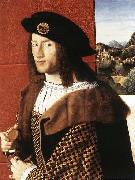La Peinture à l'huile en gros de Chine & Encadre |
|||||||||||

|
|||||||||||
|
|
|
||||||||||||||
|
BARTOLOMEO VENETO
Italian Painter, ca.1470-1531 |
||||||||||||||
|
|
||||||||||||||
|
||||||||||||||
|
|
||||||||||||||
| BARTOLOMEO VENETO
Italian Painter, ca.1470-1531 Portrait_of_a_Gentleman 1512 Oil on panel, 73 x 58 cm Galleria Nazionale d'Arte Antica, Rome Earlier this picture was described as a work of Leonardo. Later, the panel was attributed to Holbein. Finally, of exceptionally high quality, the painting was given to Bartolomeo Veneto by comparing it to two other portraits by the same painter, now at Houston and Washington. The proposed dating is the second decade of the sixteenth century (perhaps 1512), in the wake of Bartolomeo's sojourn in Ferrara between 1506 and 1508. Bartolomeo Veneto (Bartolommeo Veneziano) attracted attention at the end of the 19th century. He was a pupil of Gentile Bellini, he worked at the Court of the Grand Duke of Ferrara and elsewhere. There he came under the influence of LOmbard artists. The artist enriched his original Venetian pictorial language with direct exposure to the influence of Albrecht D?rer, who had been active in Venice in the first years of the sixteenth century. The figures of the knight and the soldier, visible in the background, are literally copied from a 1496 woodcut by D?rer. The identity of the sitter, however, remains a mystery. We do know, however, that he must have been a gentleman attached to the Mantuan court of the Gonzagas. Recently, it was suggested that Bartolomeo Veneto may have been the talented portraitist working in Raphael's workshop who was responsible for the faces of the chair-bearers in the Vatican Palace's Mass of Bolsena. Several inscriptions are legible in the painting: on the medal of the sitter's beret is written "Probasti e Chognovisti"; on the placard above the animal on the medal are the Greek letters epsilon and tau; and along the edge of the plaquette that decorates the sword handle, "IN(?) B:VF" and "NO SPI(E)".Artist:BARTOLOMEO VENETO Title: Portrait of a Gentleman Painted in 1501-1550 , Italian - - painting : portrait 1512 Oil on panel, 73 x 58 cm Galleria Nazionale d'Arte Antica, Rome Earlier this picture was described as a work of Leonardo. Later, the panel was attributed to Holbein. Finally, of exceptionally high quality, the painting was given to Bartolomeo Veneto by comparing it to two other portraits by the same painter, now at Houston and Washington. The proposed dating is the second decade of the sixteenth century (perhaps 1512), in the wake of Bartolomeo's sojourn in Ferrara between 1506 and 1508. Bartolomeo Veneto (Bartolommeo Veneziano) attracted attention at the end of the 19th century. He was a pupil of Gentile Bellini, he worked at the Court of the Grand Duke of Ferrara and elsewhere. There he came under the influence of LOmbard artists. The artist enriched his original Venetian pictorial language with direct exposure to the influence of Albrecht D?rer, who had been active in Venice in the first years of the sixteenth century. The figures of the knight and the soldier, visible in the background, are literally copied from a 1496 woodcut by D?rer. The identity of the sitter, however, remains a mystery. We do know, however, that he must have been a gentleman attached to the Mantuan court of the Gonzagas. Recently, it was suggested that Bartolomeo Veneto may have been the talented portraitist working in Raphael's workshop who was responsible for the faces of the chair-bearers in the Vatican Palace's Mass of Bolsena. Several inscriptions are legible in the painting: on the medal of the sitter's beret is written "Probasti e Chognovisti"; on the placard above the animal on the medal are the Greek letters epsilon and tau; and along the edge of the plaquette that decorates the sword handle, "IN(?) B:VF" and "NO SPI(E)".Artist:BARTOLOMEO VENETO Title: Portrait of a Gentleman Painted in 1501-1550 , Italian - - painting : portrait |
||||||||||||||
|
Related Paintings to BARTOLOMEO VENETO :. |
||||||||||||||
|
|
||||||||||||||
|
|
||||||||||||||
|
CONTACTER DES Etats-Unis |







